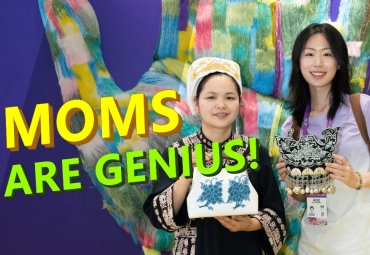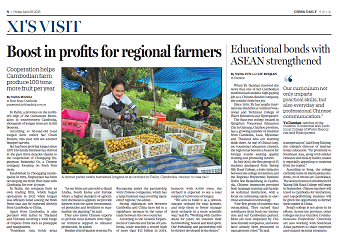China's Village Super League resumes after floods







China's Village Super League, also known as Cun Chao, resumes in Rongjiang county, Guizhou province on July 26, 2025. [Photo by Yao Jingquan/for chinadaily.com.cn]
With the mud cleared and houses rebuilt after severe floods, the Village Super League, or Cun Chao, again welcomed passionate soccer players and audience in Rongjiang county, Guizhou province, over the weekend.
The brand-new green field, the cheers of the fans, the bustling vendors — everything seemed unchanged.
Rongjiang, the birthplace of Cun Chao, was hit by rain-triggered floods on June 24 and 28. Who could have imagined that just a month after this disaster, which submerged two-thirds of the main urban areas and destroyed almost all infrastructures, and affected tens of thousands of people, the event would regain its former glory in such a short time?
The Cun Chao resumed on Saturday under the theme "Gratitude, Rise Up, Guizhou's Super Power", inviting all rescue teams and donors who participated in the flood relief efforts.

China's Village Super League, also known as Cun Chao, resumes in Rongjiang county, Guizhou province on July 26, 2025. [Photo by Yao Jingquan/for chinadaily.com.cn]
"We must urge everyone to act quickly, and not dwell too long in the aftermath of the disaster," said Xu Bo, Party secretary of Rongjiang, adding that he believed "after a major disaster comes great revival and great progress".
He added the quick reconstruction owes to its 385,000 people, and disaster-relief workers from around the country. "Through resumption of Cun Chao, we wanted to thank all helpers in this disaster and show our confidence in restarting like the 'phoenix reborn from the ashes'," he said.
The event on Saturday included soccer games, singing and dancing performances, and a parade in the theme of gratitude. Italian soccer star Roberto Baggio and Brazilian soccer star Roberto Carlos appeared on the pitch, drawing waves of cheers from the fans. They learned to sing a Miao ethnic song and lit a torch.
Baggio was announced to be appointed as the honorary head soccer coach of Rongjiang Secondary Vocational School, while Carlos was named honorary advisor. Baggio encouraged young soccer fans: "If you want to see results on the field, you must put more effort into training and find your own joy in football."
The event on Saturday attracted tens of thousands of audience.
Chen Yonghe, a doctor from Guangdong province who works in Qianxi, Guizhou, said he wanted to feel the cheerful atmosphere of sports so he came. "Before the disaster, I had visited here to watch a soccer match, and I never expected the area to recover so well in such a short time. The entire stadium and the roads show no traces of the disaster. We could really feel how much effort the rescue workers must have put in during the relief efforts," he said.
An audience member surnamed Yang said he was very excited to have this event resumed for soccer fans like him to "enjoy pure soccer and feel the pure unity of people".

China's Village Super League, also known as Cun Chao, resumes in Rongjiang county, Guizhou province on July 26, 2025. [Photo by Yao Jingquan/for chinadaily.com.cn]
As of now, power, water, communications and main roads have recovered. Resumption rate of restaurants and hotels surrounding the Cun Chao stadium has reached 96 percent, according to local authorities.
Wei Zhuying, who runs a chain-brand milk tea store at the biggest commercial complex of the county, said her store was reopened on July 22.
The store's walls and counter were rebuilt, with old machines soaked in flood replaced with new ones. "Our headquarters compensated equipment valued at 200,000 yuan ($27,900) to 300,000 yuan ($41,800) and other materials. The county government waived one and a half months of rent and reduced taxes," she said.
Wei added she was worried business might be affected after the disaster, but since reopening, it hasn't been impacted much.
She and her husband had been volunteers distributing supplies and cleaning mud and debris at other shops. "I saw so many helpers from outside the county and as locals, we also wanted to give a hand," she said.

China's Village Super League, also known as Cun Chao, resumes in Rongjiang county, Guizhou province on July 26, 2025. [Photo by Yao Jingquan/for chinadaily.com.cn]
The store gave away 2,500 cups of milk tea per day at the stadium on July 26 and 27. Another 300 cups were distributed for volunteers, players, and staff.
"I think resuming Cun Chao is a way to thank all the kind-hearted people who helped us, without whom, the county wouldn't look as clean and restored as it does now. It might still be a mess," she said.
The national finals of Cun Chao will begin on Aug 9. The national tournament also serves as a crucial selection event for Chinese grassroots teams aiming to participate in the 2028 "Cun Chao World Cup".
Liu Qingle, deputy director of the Department of Public Administration at the Central University of Finance and Economics in Beijing, said Rongjiang makes a good example of leveraging its advantages in sports to develop culture and the tourism industry, gaining good economic returns, improving its business environment, benefiting locals' livelihoods and realizing rural vitalization.
He added Cun Chao introduces trendy tools such as metaverse and aerial viewing for watching the games to enhance the experience of the audience. It also created a shared economy model in which 50 percent of brand benefits were allocated to the local people.
"Rural areas, when developing new quality productive forces, should consider their own advantages. Instead of eyeing only high-tech industries, the potential in upgrading traditional industries is also enormous," he said.
Li Dong, a professor at Tsinghua University's Institute for Urban Governance and Sustainable Development in Beijing, said Rongjiang has cool weather, good geological locations and a lot of sports lovers who share a passion for soccer, all helping Cun Chao to prosper.
Although the Cun Chao was initially a non-profit sporting event, its rising popularity has unexpectedly boosted consumption and investment, he said. He suggested that when local governments consider pathways to modernization, they should prioritize identifying genuine needs, accurately assessing resource endowments and industrial foundations and adopting scientific and effective policies.
All rights Reserved. 京ICP备13028878号-8

 Overview
Overview Guiyang
Guiyang Guian New Area
Guian New Area Liupanshui
Liupanshui Anshun
Anshun Qianxinan
Qianxinan Qiandongnan
Qiandongnan Qiannan
Qiannan Zunyi
Zunyi Tongren
Tongren Bijie
Bijie Guizhou commits to culture preservation and rural vitalization
Guizhou commits to culture preservation and rural vitalization Guizhou voice at 2025 national two sessions
Guizhou voice at 2025 national two sessions Meet the 'genius moms' at Shenzhen cultural fair
Meet the 'genius moms' at Shenzhen cultural fair 

